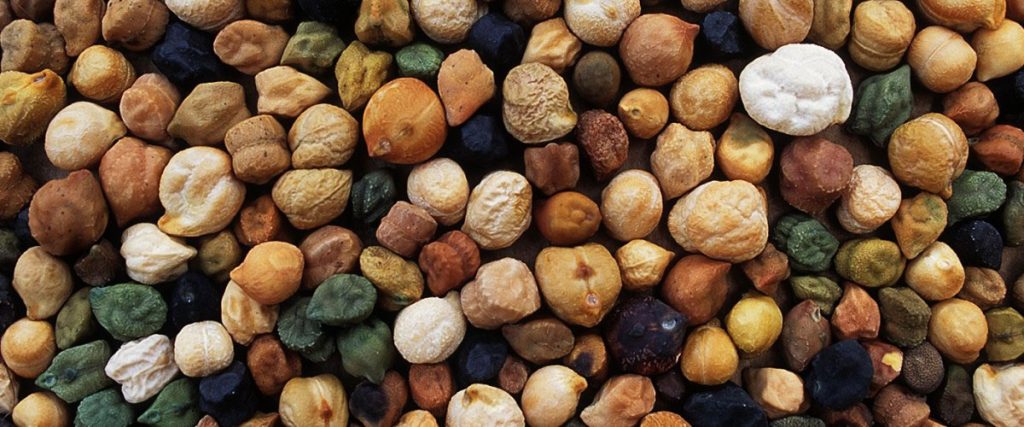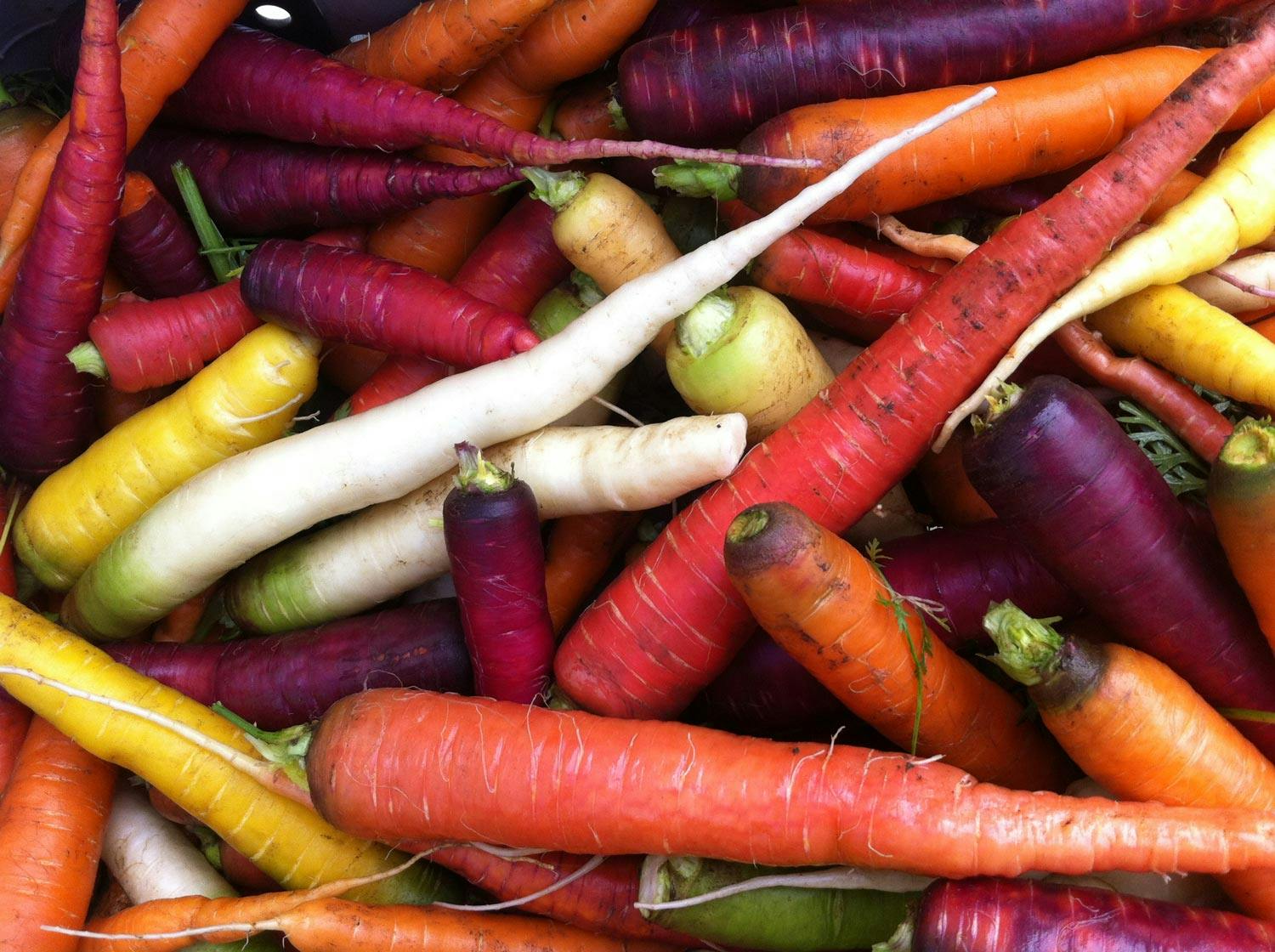Open-Source Seeds Keep Big Ag Out of Home Gardens
The open-source seed movement fights corporate overreach in our own backyards.
A colorful collection of carrots grown from open-source pledged seeds
A home garden yields simple pleasures: time spent outdoors, the gratification of watching something you planted grow, delicious food to eat… and independence from the agricultural giants that dominate our food system. Gardeners across North America are starting their spring planting, and some are using seeds sporting an “Open Source” label. Riding the coattails of consumer preferences for the organic and locally grown, the burgeoning open-source seed movement helps gardeners resist corporate efforts to prevent seed-saving.
The practice of saving and sharing seeds dates from the dawn of agriculture. Only in recent decades has the expansion of intellectual property rights over plant genetic material (also called germplasm) altered plants’ status as a public good. Prohibitions on saving seeds via intellectual property law — known as “bag tag” restrictions because they’re often printed on tags attached to bags of seed — are familiar to farmers, especially those growing corn, soybeans, and cotton. But home gardeners may assume they have the right to save and share seeds, while in fact large biotech companies have patents on many of the seeds marketed to them.
Carol Deppe — a plant breeder, author, and owner of Fertile Valley Seeds in Oregon — argues that the principle behind seed-saving matters to most ordinary gardeners, even if they don’t save seeds themselves. “People like the independence of gardening,” she said in an interview. “It matters in principle if a seed is savable, whether or not they choose to [save seed] … If you do not have the right to save a seed, your emotional feeling about gardening as an act of independence changes.”
It matters in principle if a seed is savable, whether or not gardeners choose to save seed.
A group of plant breeders, farmers, seed companies, and sustainability advocates came together at a 2012 academic conference to discuss a response to this corporate encroachment. Inspired by open-source software — which permits users to freely access, modify and distribute source code — they founded the nonprofit Open Source Seed Initiative (OSSI). OSSI co-founder Dr. Claire Luby said in an interview, “the idea for an open-source seed license had been popping up in different places,” from academia, to social justice groups and plant breeders.
The group’s first public action was to release 37 cultivars of 14 species under an open-source seed pledge written by Luby and two fellow University of Wisconsin professors:
You have the freedom to use these OSSI-Pledged seeds in any way you choose. In return, you pledge not to restrict others’ use of these seeds or their derivatives by patents or other means, and to include this Pledge with any transfer of these seeds or their derivatives.
If you have a home garden, you’re in good company. According to the National Gardening Association (NGA), 1 in 3 American households grow food, and participation in community gardens increased 200% from 2008 to 2013. This increase was enough for NGA president Mike Metallo to declare the arrival of a “food revolution.” But corporate control of the genetic resources fueling that revolution has also expanded to historic proportions.
While we tend to think of seeds as a starting point, they have a supply chain, and the average gardener depends on multinational corporations to a greater degree than most would prefer. Thanks to the consolidation of the seed industry, even organic and heirloom seeds may be purchased from subsidiaries of the Big 4 chemical companies: Bayer (owner of Monsanto), Corteva (born from the merger of Dow and Dupont), ChemChina (which acquired Syngenta), and BASF.
These corporations control almost 70% of seeds and their germplasm, not just for farm crops, but for home-garden varieties of vegetables, fruits, shrubs, and flowers. “This is not just a corn, soybean, commodity crop issue,” said Luby. Big companies’ intellectual property rights (IPRs) over plant varieties prohibit food growers from saving, replanting, or sharing seeds.
Fewer companies controlling new seed varieties means fewer options that might work for the region you live in.
Luby sees other impacts of seed IPRs on home gardeners, too: “Do you like having options in your seed catalogue when you buy seed?” she asked. “Those options are created by plant breeders, and if there’s fewer and fewer companies controlling new seed varieties, it means there are fewer options that might work for the region you live in or the flavors you like. ”
By restricting the sharing of plant germplasm, intellectual property laws stifle seed diversity and threaten the development of novel traits that benefit society — like adaptation to climate change, disease resilience, and performance under conditions with low inputs of fertilizers, pesticides, and even water.
Nonetheless, it isn’t surprising that fighting plant patents hasn’t become a priority within the food movement. In addition to legal complexity, the concept of owning varieties of living beings is counterintuitive. In his essay “Civil Disobedience in the Garden,” plant breeder Frank Morton crystalizes how patents on plants are so confounding: “Isn’t any living being a sum of its own evolutionary history? Who can own that?”
Both Luby and Oregon plant breeder Deppe — who serves on the OSSI board — have noticed an increase in intellectual property notices in seed catalogues. “More and more people are labeling seeds,” said Luby.
According to Deppe, these notices inform potential customers, “Hey, you are just renting these seeds for a year.”

Breeders around the world have pledged seeds from a wide range of plant varieties as open-source.
Open-source seed pledging is a powerful tool of resistance against corporations’ shoring up of plant genetic resources. Aiming to “preserve the rights of farmers, gardeners, and breeders to freely use, save, replant, and improve seed,” OSSI’s vision also addresses challenges in plant breeding and research, including plant diversity and biological resilience. Since its founding, OSSI has succeeded in its objective to “enlarge the pool of crop varieties that are ‘OSSI-Pledged,’ and so are freely available for use and improvement.”
OSSI partners with plant breeders who pledge novel varieties as open-source. By using unrestricted plant germplasm, breeders create novel varieties, then release the seeds to the public under the OSSI Pledge. Pledged seed guarantees a range of freedoms to potential users:
- the freedom to save, regrow, share, trade, or sell seed
- to make crosses, or breed new lines and varieties
- to trial and study seed
- and to share/publish new information about them.
Additionally, plant breeders are able to preserve the availability of plant germplasm by protecting it from being patented. Perhaps the most ingenious aspect of the OSSI Pledge is its viral quality — derivatives of any open-source seed cannot restrict access to, or use of, a pledged variety.
There are currently 475 varieties of open-source seeds available for purchase through OSSI’s 63 seed company partners in the US, Canada, Australia, and Europe. OSSI-pledged seeds include Deppe’s Candystick Dessert delicata squash and Goldini Zucchini — both of which reportedly flew off the shelves at the Berkeley Bowl grocery when a local farmer cultivated them — and a panoply of tomato, pepper, squash, bean, carrot, kale, corn, and even quinoa varieties.
OSSI’s mission of maintaining “fair and open access to plant genetic resources worldwide” has inspired people across the globe to add to the pool of OSSI-pledged seed varieties. The second phase of the open-source seed movement will be achieving widespread use of pledged seeds by consumers in their home, school, or community gardens.
Deppe believes open-source principles fit with the values of her customers, who prioritize flavorful organic food, grown from locally adapted seed varieties, sold by a small company. She said they’ve responded enthusiastically to the open-source seeds already in her catalogue: “The people who heard us talking about OSSI and saw OSSI on [seed] packets, they got it… instantaneously.”
It wasn’t mega-farmers who led the way with organic varieties, it was the home gardeners.
“Home gardeners are often the leaders and the conscience of the food movement,” she said. “It wasn’t mega-farmers who led the way with organic varieties, it was the home gardeners who wanted them. And with heirloom tomatoes, it’s home gardeners who remind everyone that commercial varieties taste like crap.” In her experience at Fertile Valley Seeds, engaging gardeners in dialogue about open-source seeds was less about changing minds, and more about providing opportunities to those who already believe seeds are part of humanity’s common heritage.
Over the past decade, consumer backlash to market institutions’ control over agricultural production has transformed the food economy via increased demand for ethically sourced products. More and more people are asking the kinds of questions Dr. Luby says are central to open-source gardening: “Who or what is behind the seeds in my seed catalogue? Does this company share my values?”
For home gardeners seeking liberation from the tethers of Big Ag, OSSI and its seed partners are a useful resource. While OSSI has not yet found an efficient way to track sales of OSSI-pledged seeds across companies, Claire Luby is optimistic that the open-source ethic is picking up steam among regular home gardeners: “Anecdotally, I think people are recognizing [the value of open-source seeds], especially in the organic seed world.”
Every OSSI-pledged seed purchase reinforces the idea of seed-saving as an inherent right.
Every OSSI-pledged seed purchase reinforces the idea of seed-saving as an inherent right. And that idea, Deppe believes, is just as crucial as whether the food we’re eating is delicious, homegrown, and organic.
“Do you have a right to grow food?” asked Deppe. “You can’t grow food if you don’t have a right to use the seed. And if you don’t have the right to grow food, what is there left?”
